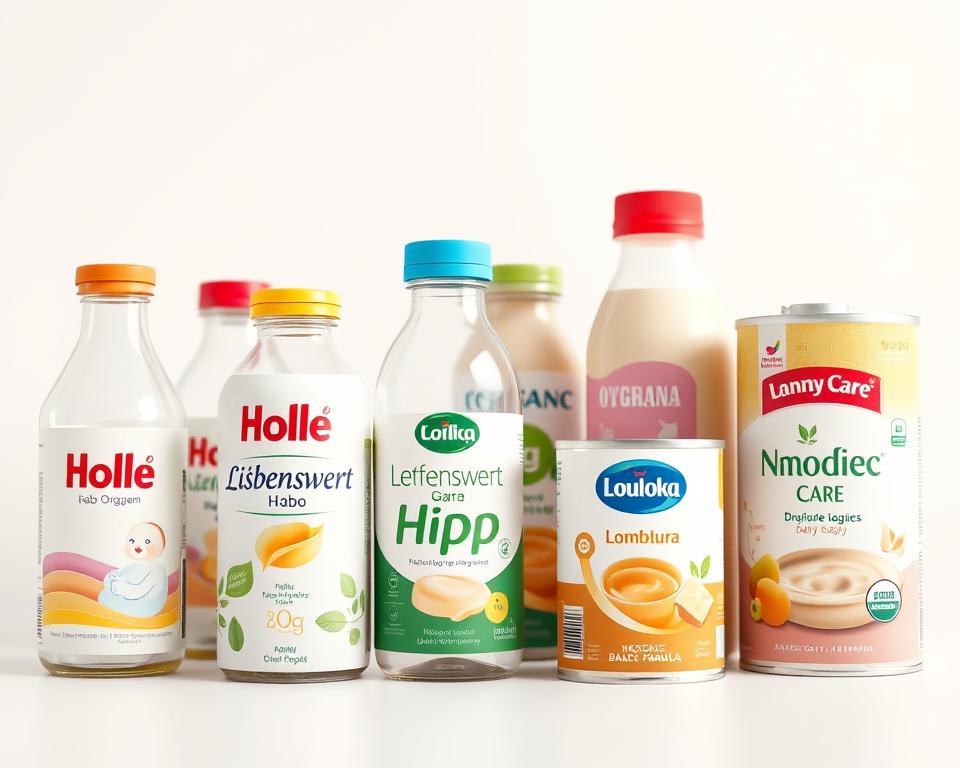Uncover the Best Organic Formula Options: Mom & Dad’s Manual
Roughly 80% of U.S. parents turn to formula within baby’s first twelve months. Breastfeeding hurdles often lead to this choice. Choosing the right infant formula subscription is essential for these families. Our handbook helps caregivers choose the optimum organic formula for their little ones.
We’ll review key brands and blends with an eye on purity and nutrients. This information is vital for ensuring a healthy start for your child.
Every caregiver faces the weighty choice of baby’s first foods. Organic infant formula has gained popularity due to its focus on organic ingredients. It offers a cleaner feeding alternative. By excluding chemical residues, they ensure a safer early diet.
Caregivers now prioritize non-GMO, additive-free options. These worries underscore why organic formulas are the preferred safe option.
Perks of Using Organic Elements
Certified organic components deliver notable advantages. Rigorous inspections guarantee their premium standards and security. Picking organic varieties lets caregivers know their baby avoids toxic residues.
Organic farming methods champion eco-friendly and sustainable practices. Thus, organic choices support both your baby’s health and the planet.
Associated Health Advantages
These formulas may foster healthier developmental results. Research shows organic-fed infants tend toward fewer tummy troubles and allergy risks. The absence of chemicals underpins these positive effects.
Moms and dads value how organics deliver complete nourishment. They bolster development and holistic infant health.

Key Features to Look for in Organic Baby Formula
Selecting premier organic infant formula matters dramatically for your child’s wellbeing. It’s important to consider the protein sources and the essential nutrients. Protein composition and proportions influence digestibility and nutrient uptake. Also, knowing the essential nutrients ensures your baby gets the best support for growth and development.
Protein Sources and Ratios
Whey and casein form the protein base in many formulas. Whey breaks down quickly and casein releases nutrients gradually. More whey generally equals gentler digestion for infants. Organic formulas often aim for a higher whey ratio to aid in digestion. Choose products that specify their protein blend and proper proportions.
Vital Additives and Health Boosters
It’s vital to consider the essential nutrients in infant formula for development. Docosahexaenoic acid and arachidonic acid support neural and visual development. Including prebiotics helps establish gut flora and immunity. Check for these additives in formulas to ensure your baby gets a full range of nutrients. Such formulas deliver these elements via natural means.
| Protein Source | Benefits | Whey-to-Casein Ratio |
|---|---|---|
| Whey | Easier digestibility|Gentle on tummies|Quick absorption | Higher ratio is better|Lean whey blend preferred|Above 60% ideal |
| Casein | Slow release of nutrients|Sustained nourishment|Stomach-friendly over time | Lower ratio preferred in early months|Casein kept minimal|Around 40% or less |
Popular Organic Baby Formula Brands
Moms and dads rely on established brands when buying organics. Here are premier brands with their signature benefits. They lead the organic formula market, serving diverse dietary demands.
Kendamil: The Whole Milk Option
As the sole whole-milk organic formula, Kendamil stands out. Enjoy its luscious consistency free from unwanted chemicals. Caregivers favor it for its simple, clean ingredients. You can easily purchase Kendamil with a few clicks.
HiPP’s Combiotik for Delicate Digestions
HiPP Combiotik is crafted to be gentle on sensitive stomachs. It includes prebiotics and probiotics for better digestion. Parents often choose HiPP for its commitment to organic, high-quality ingredients, making it a favorite in organic baby food shops.
Holle Bio: Trusted European Quality
Holle Bio is renowned for its biodynamic farming practices, providing premium certified organic formula. It’s known for its rigorous quality control and commitment to health and the environment. Parents trust Holle for its authentic taste and nutrition.
Aussie Bubs Grass-Fed Blend
Aussie Bubs is notable for using grass-fed cow ingredients, ensuring high nutritional value. All components reflect a back-to-nature approach. Its unique approach makes it easy for parents to spot quality in organic baby formulas.
Bobbie’s Forward-Looking Formula
Bobbie is at the forefront of baby nutrition, blending modernity with thoughtful formulation. It meets contemporary dietary needs while upholding organic integrity. Moms and dads trust Bobbie for its evidence-based, organic formula.
Selecting the appropriate organics involves assessing baby’s unique nutrition profile. Recognizing food sensitivities helps you avoid tummy troubles. Component choices matter for infants prone to digestive issues.
Assessing Dietary Sensitivities
Infants can respond poorly to lactose or intact proteins. Look for formulas designed for sensitive infants. Hypoallergenic formulas use partial hydrolysis and minimal lactose. They work to calm upset stomachs and nurture gut balance.
Seek medical advice to confirm the best feeding option.
Prioritizing Gut Ease
Digestive comfort is essential for infants, and the right organic formula is key. Inclusions of pre- and probiotics support a balanced gut flora. They help in developing a healthy gut flora, improving digestion and nutrient absorption.
For parents looking for the best organic formula for breastfed babies, many options offer essential nutrients.
How to Transition to Organic Baby Formula
Moving to organics from breast milk or conventional formula works best with steady changes. Knowing the right approach helps both caregiver and infant adjust. Slowly shifting ratios eases acceptance and prevents distress.
Transition Timeline
Begin with small amounts of organics mixed in. Follow these tactics for easy switching:
- Kick off by blending one part organic with three parts regular formula.
- Slowly tilt the balance until you reach 100% organic.
- Monitor your baby’s reactions closely. If your baby shows signs of discomfort, slow down the process.
- Offer the organic baby formula at controlled times during the day to help your baby associate it positively.
- Stick to a feeding routine, as consistency can make the transition smoother.
Positive Transition Signals
Observing positive cues lets you know the switch is working:
- Infant feeds calmly with little to no protest.
- Regular bowel movements and digestion remain consistent.
- Hunger levels and feeding frequency stay stable.
- Infant seems satisfied and relaxed post-feeding.
Successful organic baby formula acceptance can take time, but these signs indicate a positive adjustment to the new nutrition.
Organic vs. Standard Baby Formulas
Many parents are torn between organic baby formula and traditional formula when it comes to their infant’s nutrition. Making the right pick ensures optimal nutrition for little ones. Priority on safe elements and developmental advantages leads the selection.
Ingredient Differences
Ingredient lists mark the key divergence between organics and regular formulas. Organic formulas opt for natural components, excluding artificial additives, flavors, and preservatives. Labels such as HiPP and Kendamil source from eco-friendly dairies. Regular formulas can pack artificial additives and GMO-derived compounds. This highlights the organic formulas’ focus on natural, wholesome nutrition.
Price Differences
Organic formulas generally carry premium pricing because of certification expenses. Certification and sustainable farming drive up the price tag on organics. Despite the higher cost, many parents see the health benefits as worth the investment. Understanding the price and perceived value helps parents make a choice that fits their budget and values.
Digital retailers have transformed organic formula purchasing. You can shop for the best organics without leaving your house. It enables discovery of specialty formulas for different needs.
Buying Formula Online Perks
Online shopping brings numerous benefits for parents with hectic schedules. Easy ordering from any location.
- Convenience
- Variety: Explore an extensive selection of organic baby formulas across different brands
- E-tailer discounts often undercut store prices
Subscription Services Explained
Infant formula subscription services have become increasingly popular. Automated orders keep your formula supply constant.
Subscription plans typically offer these perks:
- Never worry about restocking
- Customizable Frequency: Choose how often to receive deliveries based on your family’s needs
- Subscription rates often beat retail prices
Compliance Requirements for Organic Formulas
Ensuring the safety and quality of organic baby formulas is a complex task. A web of rules ensures product safety and authenticity. FDA mandates safeguard formula nutrient profiles and hygiene. USDA organics approval confirms true organic sourcing. Understanding these standards empowers parents to make informed choices for their infants.
FDA Regulations and Safety Measurements
U.S. FDA controls critical aspects of formula manufacturing. They specify exact nutrient amounts and ingredient safety limits. Such rules guarantee balanced nourishment for infants. Main elements are:
- Mandatory ingredient listings|Required ingredient disclosures|Compulsory component labeling
- Specific nutrient requirements such as protein, fats, and vitamins|Defined macro- and micronutrient thresholds|Preset nutrition minimums
- Comprehensive quality control measures during manufacturing|Rigorous production inspections|Stringent safety checks
Following these rules means infants receive only approved formulas.
USDA Organic Certification Guidelines
USDA organics seals mark trusted formula authenticity. The certification process involves several essential criteria. Key criteria include:
- Proof that ingredients are produced without synthetic fertilizers or pesticides|No chemical fertilizers or sprays used|Farm inputs must be 100% natural
- Verification of non-GMO (genetically modified organism) status|Guarantee of GMO-free sourcing|Strict non-GMO testing
- Clear guidelines on the handling and processing of organic products|Protected organic integrity during production|Certified organic processing rules
USDA-approved organics guarantee farm-level purity. This promotes healthier options for infants. The combination of USDA certification with FDA regulations provides parents with confidence in their baby’s nutrition.
| Regulatory Aspect | Description |
|---|---|
| FDA Regulations | Sets safety and nutrient standards for infant formula |
| USDA Organic Certification | Ensures organic ingredients are grown without harmful substances |
| Quality Control | Mandatory checks during production processes |
| Ingredient Transparency | Clear labeling of all components for consumer knowledge |
How to Purchase Organic Infant Formula
Deciding on the best organic option can appear complex. But with key tips, parents can confidently select the best option. Understanding retailers and label terminology streamlines the choice.
Top Online Retailers
Numerous reputable e-retailers stock certified organics. You’ll find periodic discounts online. Here are some top choices:
- Amazon – Famed for selection and speedy delivery
- Target – Features same-day delivery and curbside pickup
- Walmart – Blends e-commerce with neighborhood store stock
- Thrive Market – Focuses on health-conscious products, including organic options
Review shopper comments for real-world insights. Use reviews to judge formula performance and vendor service.
Understanding Labeling and Certifications
Interpreting certifications prevents misinformed purchases. Look for certifications that confirm the product’s organic status. Typical certifications are:
| Certification | Description |
|---|---|
| USDA Organic | Indicates the formula contains at least 95% organic ingredients |
| Non-GMO Project Verified | Means the formula does not use genetically modified organisms |
| European Union Organic | Denotes adherence to EU organic farming regulations |
Knowing these certifications ensures the formula is not only nutritious but also safe for your baby.
The Bottom Line
As we conclude this organic baby formula overview, it’s evident that selecting the right formula is critical for your baby’s health. Organic baby food offers more than just ingredients; it ensures your child’s overall well being. It provides vital nutrients without harmful additives. Parents have discovered key factors to consider, such as protein sources, dietary sensitivities, and the reputation of brands like Kendamil, HiPP Combiotik, and Holle Bio.
This article highlighted the need for formulas that meet your baby’s specific needs. Switching to organics requires a thoughtful approach. Incremental change safeguards digestive ease.
By considering the discussed tips and features, parents can make informed decisions among the vast market options. Choosing organics lays a foundation for enduring wellness. Remain committed to offering the best start in life. Empower early eating habits with carefully selected organics.

